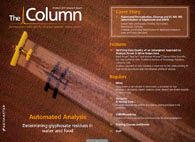GC-MS detects stress levels
Breath may be an indicator of stress levels according to a study published in the Journal of Breath Research.1
Breath may be an indicator of stress levels according to a study published in the Journal of Breath Research.1 The breath samples of 22 individuals were analysed by performing thermal desporption–gas chromatography–mass spectrometry (TD–GC–MS) to pinpoint six stress sensitive compounds.
Stress is the by-product of the evolutionary “fight‑or‑flight” response. In a situation percieved to be challenging, or in some cases threatening, the body’s biological processes change in preparation. The most obvious change induced by fear or anticipation is an increase in heart rate and blood pressure.The study hypothesized that this would result in a change in the chemical profile of breath samples. These samples were collected from subjects following psychological interventions — designed to either induce stress or maintain a relaxed state of mind. One intervention used was a mental arithmetic test, while another was listening to classical music.
The four compounds identified to be elevated following induced stress were indole, 2-hydroxy-1-phenylethanone, benzaldehyde and 2-ethylhexan-1-ol. 2-methylpentadecane was tentatively identified and another componenent remained undetermined.
It is plausible that this non-invasive test could be used in clinical settings to determine the stress levels of patients.
Reference
M.A. Turner, S. Bandelow, L. Edwards, P. Patel, H.J. Martin, I.D. Wilson and C.L.P. Thomas, Journal of Breath Research, DOI: 10.1088/1752-7155/7/1/017102 (2013).
This story originally appeared in The Column. Click here to view that issue.

Polysorbate Quantification and Degradation Analysis via LC and Charged Aerosol Detection
April 9th 2025Scientists from ThermoFisher Scientific published a review article in the Journal of Chromatography A that provided an overview of HPLC analysis using charged aerosol detection can help with polysorbate quantification.
Analyzing Vitamin K1 Levels in Vegetables Eaten by Warfarin Patients Using HPLC UV–vis
April 9th 2025Research conducted by the Universitas Padjadjaran (Sumedang, Indonesia) focused on the measurement of vitamin K1 in various vegetables (specifically lettuce, cabbage, napa cabbage, and spinach) that were ingested by patients using warfarin. High performance liquid chromatography (HPLC) equipped with an ultraviolet detector set at 245 nm was used as the analytical technique.
Removing Double-Stranded RNA Impurities Using Chromatography
April 8th 2025Researchers from Agency for Science, Technology and Research in Singapore recently published a review article exploring how chromatography can be used to remove double-stranded RNA impurities during mRNA therapeutics production.










